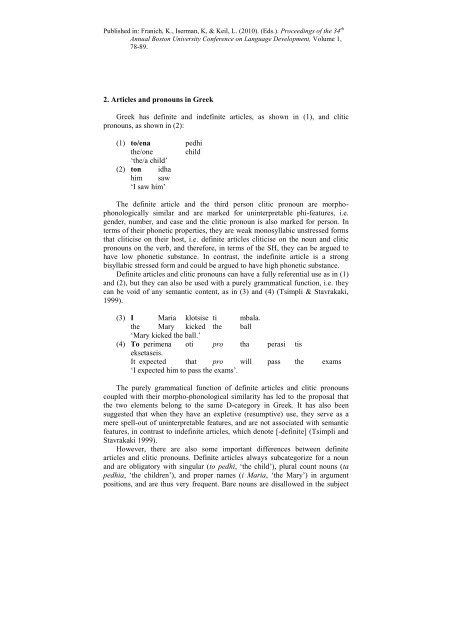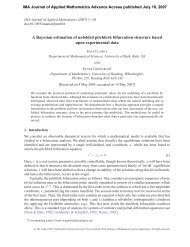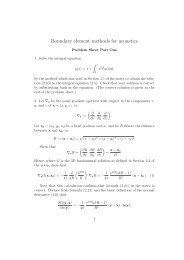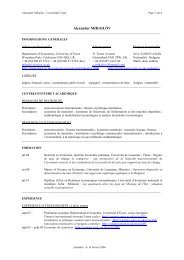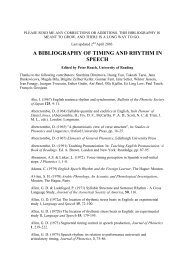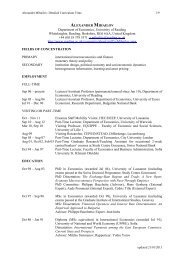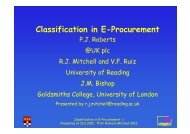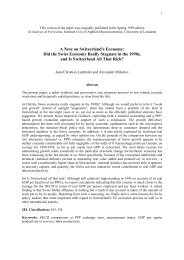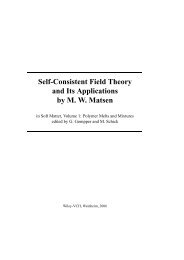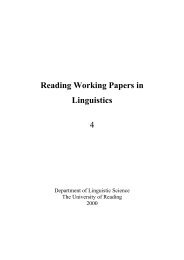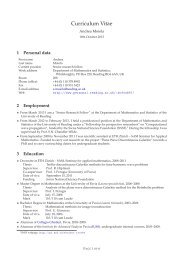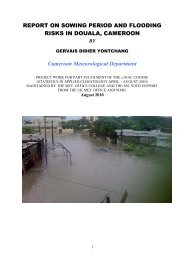On-line Processing of Articles and Clitic Pronouns by Greek ...
On-line Processing of Articles and Clitic Pronouns by Greek ...
On-line Processing of Articles and Clitic Pronouns by Greek ...
Create successful ePaper yourself
Turn your PDF publications into a flip-book with our unique Google optimized e-Paper software.
Published in: Franich, K., Iserman, K, & Keil, L. (2010). (Eds.). Proceedings <strong>of</strong> the 34 th<br />
Annual Boston University Conference on Language Development, Volume 1,<br />
78-89.<br />
2. <strong>Articles</strong> <strong>and</strong> pronouns in <strong>Greek</strong><br />
<strong>Greek</strong> has definite <strong>and</strong> indefinite articles, as shown in (1), <strong>and</strong> clitic<br />
pronouns, as shown in (2):<br />
(1) to/ena pedhi<br />
the/one child<br />
‘the/a child’<br />
(2) ton idha<br />
him saw<br />
‘I saw him’<br />
The definite article <strong>and</strong> the third person clitic pronoun are morphophonologically<br />
similar <strong>and</strong> are marked for uninterpretable phi-features, i.e.<br />
gender, number, <strong>and</strong> case <strong>and</strong> the clitic pronoun is also marked for person. In<br />
terms <strong>of</strong> their phonetic properties, they are weak monosyllabic unstressed forms<br />
that cliticise on their host, i.e. definite articles cliticise on the noun <strong>and</strong> clitic<br />
pronouns on the verb, <strong>and</strong> therefore, in terms <strong>of</strong> the SH, they can be argued to<br />
have low phonetic substance. In contrast, the indefinite article is a strong<br />
bisyllabic stressed form <strong>and</strong> could be argued to have high phonetic substance.<br />
Definite articles <strong>and</strong> clitic pronouns can have a fully referential use as in (1)<br />
<strong>and</strong> (2), but they can also be used with a purely grammatical function, i.e. they<br />
can be void <strong>of</strong> any semantic content, as in (3) <strong>and</strong> (4) (Tsimpli & Stavrakaki,<br />
1999).<br />
(3) I Maria klotsise ti mbala.<br />
the Mary kicked the ball<br />
‘Mary kicked the ball.’<br />
(4) To perimena oti pro tha perasi tis<br />
eksetaseis.<br />
It expected that pro will pass the exams<br />
‘I expected him to pass the exams’.<br />
The purely grammatical function <strong>of</strong> definite articles <strong>and</strong> clitic pronouns<br />
coupled with their morpho-phonological similarity has led to the proposal that<br />
the two elements belong to the same D-category in <strong>Greek</strong>. It has also been<br />
suggested that when they have an expletive (resumptive) use, they serve as a<br />
mere spell-out <strong>of</strong> uninterpretable features, <strong>and</strong> are not associated with semantic<br />
features, in contrast to indefinite articles, which denote [-definite] (Tsimpli <strong>and</strong><br />
Stavrakaki 1999).<br />
However, there are also some important differences between definite<br />
articles <strong>and</strong> clitic pronouns. Definite articles always subcategorize for a noun<br />
<strong>and</strong> are obligatory with singular (to pedhi, ‘the child’), plural count nouns (ta<br />
pedhia, ‘the children’), <strong>and</strong> proper names (i Maria, ‘the Mary’) in argument<br />
positions, <strong>and</strong> are thus very frequent. Bare nouns are disallowed in the subject


